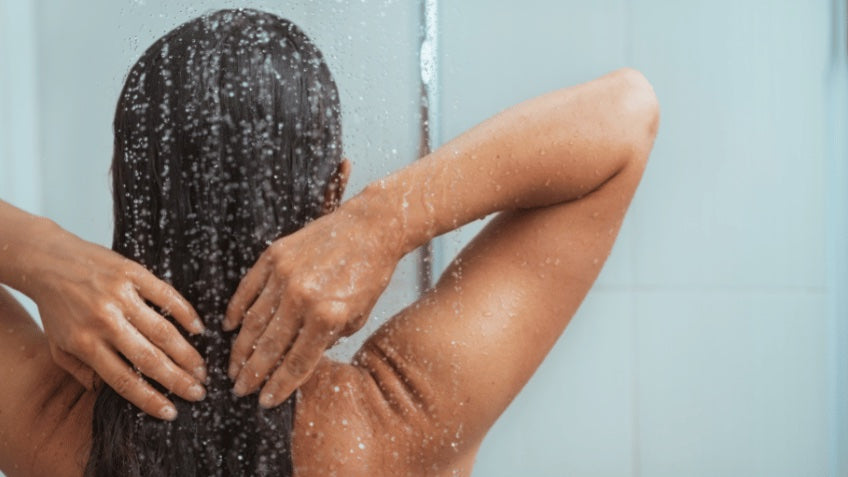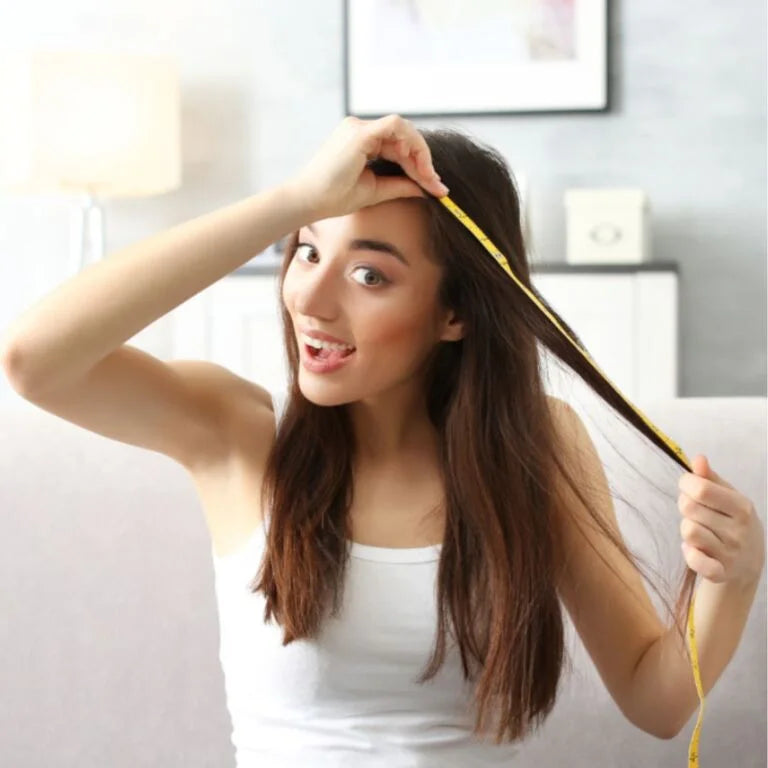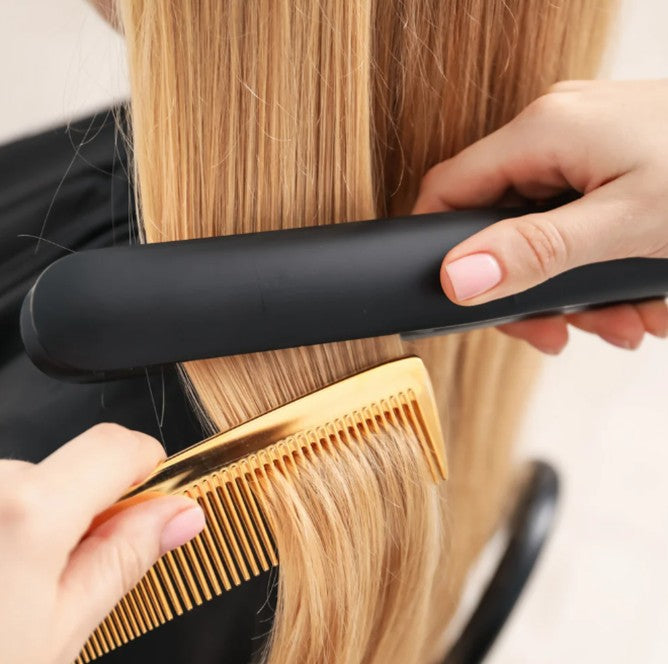How Is Your Water Affecting Your Hair?
by BRENDA L. / DEC 13, 2022

Reading Time: 6 Minutes
Index
You’re probably already aware of how your products of choice affect the way your hair and hair extensions look and feel, and if you read our blogs regularly, you’re likely to know about how your hair’s health starts from within, aka a good and balanced diet. But not many know the effects of water on our tresses, and how different places/households have different qualities of water that can be a real game changer for your mane.
1. The Effect Of Hard Water On Hair
Don’t get me wrong: hard water isn’t harmful per se, but when it comes to your beauty routine it can have some serious downsides, affecting your hair and skin.
A study from 2016 found that hard water was causing damage to the participants’ hair. This was found after washing hair samples in both hard water and distilled water for 30 days consecutively. At the end of the study, the hair washed with hard water samples had decreased in thickness and were more prone to matting and an overall ruffled appearance.
Hair symptoms you may experience from washing your hair in hard water can include but not be limited to: breakage, hair thinning, tangles, dry scalp, general dullness in your tresses, hair colour being slightly altered, frizzy hair and even hair loss.
2. Does Hard Water Damage Human Hair Extensions?
Oh yes, unfortunately Remy hair extensions are not immune to the negative effects of hard water: if anything, they are even more susceptible to them. Whilst you could potentially get away with washing your clip in hair extensions separately, perhaps with purified water or even bottled water, things work differently if you’re wearing permanent hair extensions.
In the case of tape in hair extensions, for example, the mineral buildup can impact the adhesive strip, resulting in the premature fall-off of your added strands. Other products such as nano ring hair extensions can be severely impacted too.
In the case of Remy Royale hair extensions, that are carefully treated to have their cuticles aligned and smoothed down to ensure impeccable shine and manageability, hard water takes a severe toll on the strands, altering their quality and longevity.
On top of this, hard water can impact your hair extensions’ colour, resulting in faded, lifeless strands. In some cases, blonde hair extensions in particular can even show signs of brassiness associated with mineral buildup.
3. What’s The Difference Between Hard Water And Soft Water?
Before adjusting your hair care routine accordingly, there are a few things that you can do to determine if your house’s water is soft or hard. Here’s a few signs you can use to recognise your water type.
Hard Water
When your house water is dramatically hard, one of the main signs you may notice is the sensation of having some sort of film on your skin or hair after showering. There are many other signs to look out for, such as:
- Your shower head, faucets and fixtures are covered in white spots/residue, instead of being shiny.
- The same white spots would appear on dishes, flatware, water bottles and other kitchenware after you wash these items and let them air dry.
- Shower doors and bathtubs are quickly coated in soap scum.
- Reduced water pressure as an aftermath of buildup in the pipes, shower head and faucets.
Soft Water
If your house water is soft, it will be pretty easy to recognise. As it lacks the amount of minerals to be defined “hard”, your water will be safe enough to be used on your hair and skin if it guarantees the following results:
- A good lather from a little bit of soap and a generous amount of foam (if you’re using foamy products) with just a little water added.
- Dishes, kitchenware and faucets are shiny after being left to air dry.
- Your laundry is nice and soft.
4. How To Repair Hair That Has Been Damaged From Hard Water?
If your hair has been damaged by hard water, there are a few things that you can do to fix things and bring your tresses back to their natural shine.
Use A Clarifying Shampoo
Clarifying shampoos are a great way to get rid of product buildup, including minerals that might be damaging your strands and suffocating your scalp. Depending on your washing routine, you should try and use a clarifying shampoo at least once a week to remove the mineral buildup in your tresses.
Try A Hair Detox Routine
Detoxing your hair and scalp might be the right solution to give them a breath of fresh air. You can do this with a set of specific products designed to detoxify your tresses, including a scalp scrub, or even homemade rinses with citrus and vinegar. Find more useful tips and tricks in our "How To Detox Your Hair At Home" Blog.
5. How To Prevent Hard Water Damage On Hair?
The only way to prevent hard water damage is to avoid hard water in general. Essentially, this means that you will need a water softener in your home, which can be a costly solution. If you’re looking to get better, healthier water on a budget, this is possible indeed! Look into softening shower heads – these are available both online and in hardware shops. A water-softening shower head has carbon-filled cartridges inside that are meant to filter the water before it comes out and touches your hair and skin.
6. Can You Use Bottled Water To Rinse Your Hair?
Yes, you can. This can be an effective way to prevent hard water damage on your tresses, although in the long run it can become an expensive solution. Although, this might be a life saver in case you’re on holiday somewhere where the water quality is quite poor, and you certainly cannot invest in a customised shower head.
7. Does My Water’s pH Have An Impact On My Hair?
Yes, it does. Whilst, as you now know, minerals play a huge role in making water harmful to hair, the pH levels of your home’s water can also impact your hair’s health and beauty.
A bit of science: the pH scale ranges from 0 to 14.0. Whilst 7 is considered neutral, anything below that level is considered acidic and anything from 8 to 14 is called “alkaline”. Human hair usually measures toward the acid side, at around 4.5 to 5.5 pH. Elements like water and your hair products impact your hair’s pH level, ultimately altering the quality of your tresses.
When your hair has a healthy pH level, the cuticles will be tightly sealed and aligned, resulting in that glass-like shine and smoothness that can be seen on hair models and some celebrities. Of course, chemical treatments such as bleaching, colouring, perms and relaxers can affect the state of your hair cuticles regardless of your water’s acidity.
Not only beauty, but health too: a healthy and balanced pH level in your hair and scalp doesn’t only mean that your strands will shine bright like a diamond, but will ensure that your head will be safe from fungal infections and bacteria. On top of that, the right pH level helps you retain moisture and keeps your hair strong.
8. Conclusion:
Your main source of water for your washing sessions, be it a cosy bathtub or a practical shower, is where your hair journey begins. Knowing more about your water’s quality and how this can impact your hair’s health and beauty is an essential step to adjust your hair care routine accordingly and make the most out of your washing days to get beautiful, shiny, and healthy hair.
Looking for flawless, salon-worthy hair without breaking the bank? At Cliphair, we’ve got you covered with luxurious clip in hair extensions for quick transformations and permanent hair extensions for long-lasting glam. Extensions require special care and maintenance to preserve their quality, which is why we have all the top-notch hydrating haircare products needed to keep your style on point.
Need the perfect shade? Browse our full range of human hair extensions in over 70 rich, silky shades or check out our FREE Express Color Match Service to ensure a seamless blend every time.






